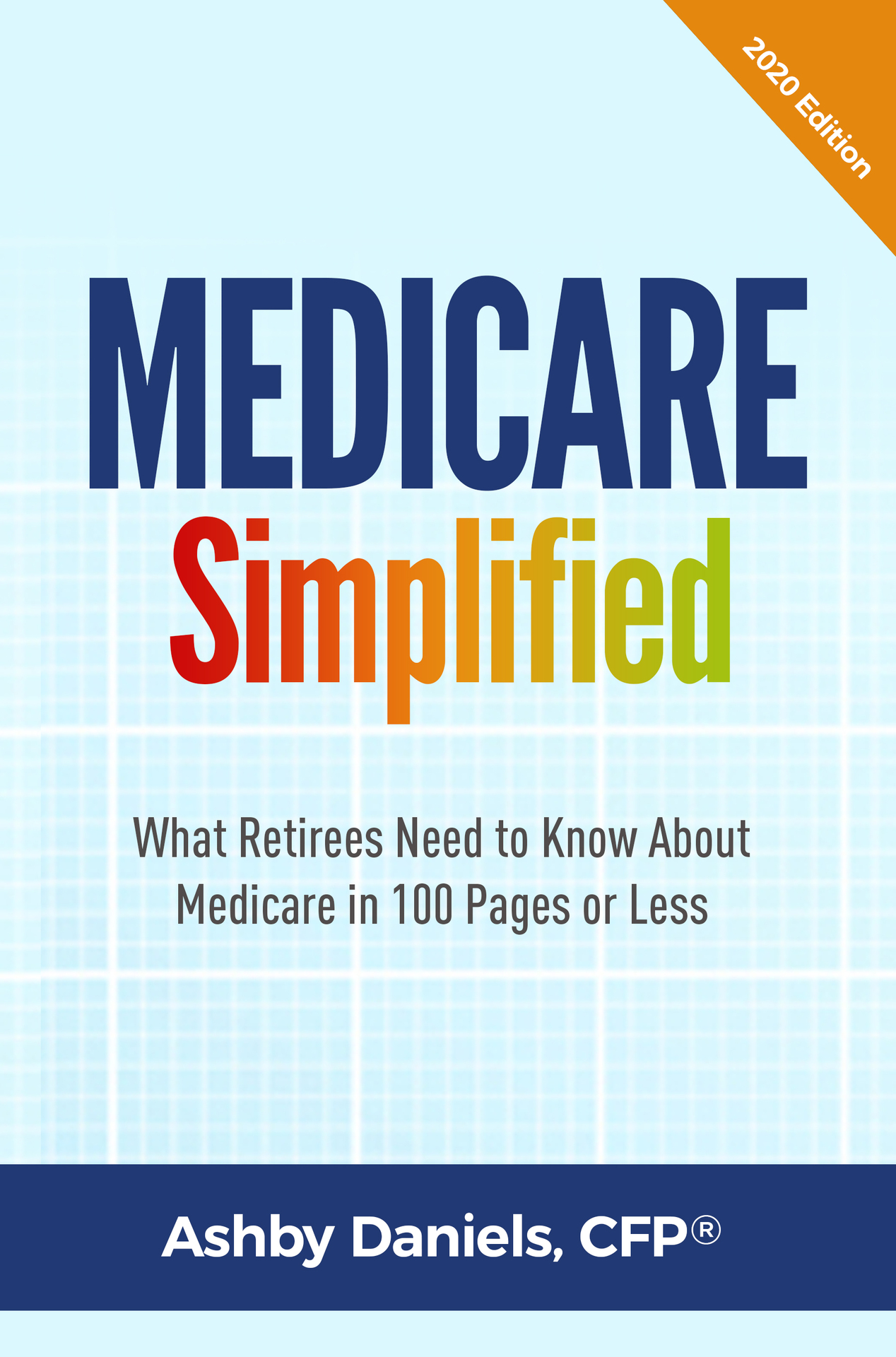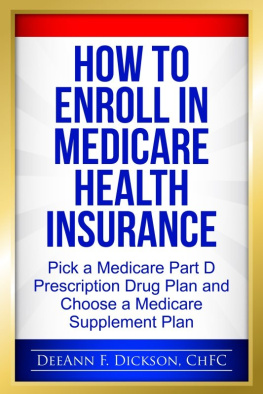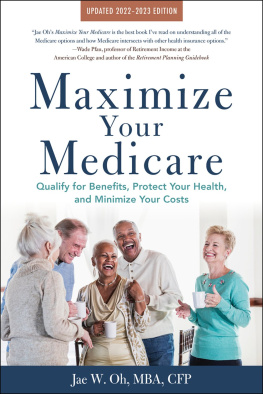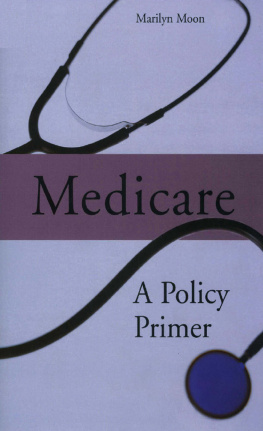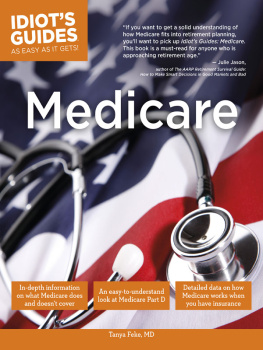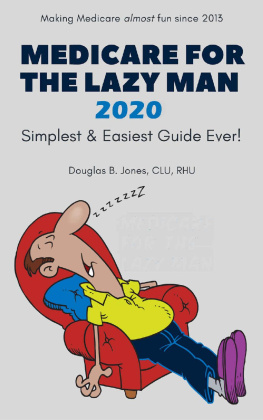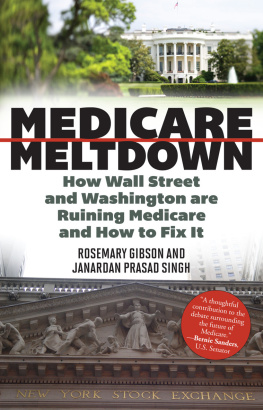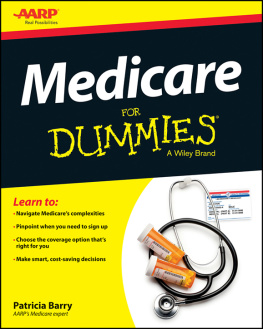MEDICARE
simplified
2020 Edition
What Retirees Need to Know
About Medicare in 100 Pages or Less
MEDICARE
simplified
2020 Edition
What Retirees Need to Know
About Medicare in 100 Pages or Less
Ashby Daniels, CFP
Copyright 2020 by John Ashby Daniels All rights reserved.
It is not legal to reproduce, duplicate or transmit any part of this document in either electronic means or printed format without express permission of the publisher. Recording of this publication is strictly prohibited.
Dedication
To every retiree trying to make sense of a complicated government program supposedly designed to serve the American public.
Disclaimer
Nothing in this book constitutes advice. While stating the obvious, by you reading this book, I cannot assess anything about your personal circumstances, your finances, your goals or objectives. Your situation is unique to you, so any opinions or information contained in this book are just that opinions or information.
Additionally, while we have made every effort to ensure the accuracy of the information contained herein, we are making no representation or warranty as to the accuracy of the material in this book.
Purchasing this book does not create any client relationship or other advisory or fiduciary relationship with the publisher or author. You, and you alone, are responsible for the financial decisions you make.
Medicare is an extremely complex program. As you can imagine a book of less than 100 or even 1,000 pages could not possibly address every possible scenario. Therefore, you should not use this book to make financial decisions. I highly recommend that you seek professional advice from a qualified individual who is authorized to provide such advice with regard to Medicare and all other areas of your financial life.
Table of Contents
MEDICARE
simplified
2020 Edition
Introduction
In my twelve years as a retirement planner and financial advisor, I have fielded hundreds of questions about Medicare. It is clear that Medicare is complex, but the fundamentals need not be overwhelming.
In the world of Medicare, things are not always as they seem. For instance, Medicare Advantage Plans (we'll get into this) are about the only plans you will see advertised on TV or be encouraged to purchase. This is so much the case that many retirees believe it's the only option available to them. They'll end up in an insurance agent's office or on the phone with the goal of "exploring" plans not realizing there is an entire world of alternative options that are, quite often, less expensive and more comprehensive than the plan being pitched at the moment - all so the salesperson can earn a commission.
I think its important and relevant to state one important fact up front: I do not sell any insurance whatsoever. I have no underlying motivation in you purchasing one plan over another nor do I have any interest in where you decide to purchase your Medicare plan.
Then, why write this book? There are two primary reasons.
First, according to academic research, approximately 66% of bankruptcies were tied to medical issues either due to the high costs of care or time out of work. Obviously, for retirees, the high cost of care is a more likely culprit. Given the volume of bankruptcies surrounding medical costs, it is my hope that an educational resource such as the one you hold in your hands may save a few retirees from the brink of bankruptcy.
Secondly, because I am a Financial Advisor who works almost exclusively with retirees, I have heard just about every question under the sun about Medicare.
It seems to me that Medicare is a bit of a black box and retirees aren't sure where to turn for information that is easily accessible. In short, people want and need the information, but they don't want to be overwhelmed by the subject matter. I think it is safe to say that reading a 300-page book on Medicare isn't most people's idea of a good time.
In lieu of boring you to death, I have tried to distill the important points I believe retirees need to know about Medicare into a short, easy-to-understand guide that might even be enjoyable to read.
The unfortunate truth - not that this will surprise you - is that no one is looking out for you and your Medicare decisions. No one is going to ensure that your choices are whats best for you and your family. That responsibility falls 100% on you.
It is also true that many of the choices you make when it comes to Medicare are irrevocable, so it is critical that you make decisions that will be best for you the first time around. Ignorance will never be an acceptable excuse when medical bills come due or when things are not going as you expected.
Your only way to defend yourself against ignorance is unfortunately to educate yourself on this very boring, but important subject.
My hope is that by reading this short guide, you will be prepared to make good decisions for you and your family.
Let's get to it.
Readers Note: Throughout this book, you will likely encounter terms that are unfamiliar. For that reason, we have included a glossary in the back of the book that includes many of the less familiar terms.
Chapter 1: Medicare
& the Problem at Hand
As an advisor working with retirees, the most common question I am asked is, Should I choose a Medigap policy or a Medicare Advantage plan?
Its an astute question. But before I answer that question, lets start with the basics.
What is Medicare?
Medicare is a federal health insurance program that covers people who are age 65 or older, certain younger people with disabilities and people with End-Stage Renal Disease. For the purposes of this book, we will only address the 65 and older group.
Generally, when people talk about Medicare, they are talking about Medicare as a comprehensive program, but it is actually broken into parts. The first part is called Original Medicare which consists of Parts A and B.
Part A and Part B are designed to cover part of the expenses related to hospital visits and most other medical services. On the surface, based on this statement, it might seem like Part A & B are sufficient to cover your health care costs, but that is highly unlikely. Let me explain.
Gaps in Original Medicare Coverage
There is a gap in the Part A & Part B system coverage. This gap is called coinsurance. If you elect to forego a supplemental policy, you are - whether you realize this or not - taking on part of the financial risk and responsibility for your healthcare costs. In fact, if all you have in retirement is Parts A & B, you will be subjecting yourself to significant (virtually limitless) risk. Lets look at an example.
For example, lets say you recently enrolled in Medicare and opted for just Parts A & B thereby forgoing any supplemental coverage. Unexpectedly, you are diagnosed with cancer. As you probably know, there are significant costs in front of you such as surgeries that often accompany such a diagnosis, plus the cost of on-going treatments. People on Original Medicare must pay the initial Part A deductible of $1,408 (2020) per benefit period (60 days) plus the Part B deductible of $198. Dont worry about the specific numbers, we will come back to them later in the book.
To be clear, there are additional nuances to the deductible, but beyond the initial responsibility of paying the deductibles, you would be responsible for 20 percent of the cost of most outpatient treatments, doctor visits and the like. And unlike the insurance plan through your employer that you are accustomed to, there is no ceiling on the 20 percent portion you are responsible for!

